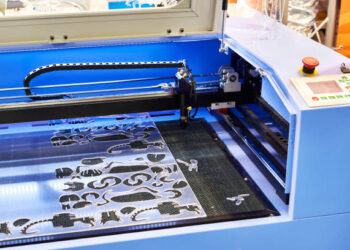Working in the antenatal and neonatal units of a hospital, I realized the importance of scales and weight measurements. This is where floor scales come in very handy.
Unlike loads that have a hook or support, you cannot hang a human being or some block industrial weights to a spring scale to measure their weight. Floor scales emerge as extremely versatile instruments for catering to various requirements. They can be used for a variety of personal and industrial applications as you will see in this post.
An Overview of Floor Scales
A floor scale or platform scale is a weighing device that consists of one or two metallic plates or surfaces on which items can be placed for the purpose of taking weight measurements. The platform could be smooth and connected with a pressure transducer mechanism that can accurately read the weight of the item(s) on it.
Industrial floor scales are the typically used types of floor scales, but due to their versatility floor scales have some other useful applications as you will see subsequently. Floor scales are designed to be placed on the floor with a platform on which items can be placed for weight measurement, and are particularly useful for weighing objects heavier than a ton.
At their core, floor scales have robust weighing devices tailored for objects surpassing the capabilities of conventional tabletop scales. They have a sturdy design and a level platform supported by load cells, which are integral to transmitting precise weight measurements via their system.
Due to their common use in rugged situations, a careful selection of stainless steel or aluminum for the platform ensures durability and high accuracy. Thus making sturdiness and precision the hallmarks of floor scales. Hence, their versatile applications.
Applications of Floor Scales as Tools for Weight Measurement
Some pivotal applications of the floor scales include weighing food ingredients/stuff, regular body weight monitoring, assessing the weight of packages for shipping, etc. This section will showcase in detail the varying applications of floor scales and why they are so versatile.
1. Industrial Applications

Industrial floor scales are indispensable tools within manufacturing facilities, warehouses, and distribution centers, where they are used daily for weighing oversized and unwieldy items. In these applications, floor scales demonstrate their prowess by accurately measuring the weight of pallets laden with goods, heavy machinery, and even vehicles.
Industrial floor scales have a considerable weight capacity spanning from 1,000 to 20,000 pounds and greater, making them the go-to choice for heavy-duty tasks. They also stand apart in their ability to endure adverse conditions such as dust, moisture, and the rigors of frequent handling.
The adaptability of industrial floor scales has made them gain significant popularity in industrial settings.
2. Healthcare and Fitness

The application of floor scales extends into the healthcare and fitness sectors. Recall my introduction about floor scales and their usefulness in taking body weight measurements.
In healthcare settings like consulting clinics, doctors’ offices, and hospital wards, floor scales serve as very useful and reliable instruments for monitoring patients’ weights, a fundamental metric that provides insight into their overall health and well-being.
Also, individuals on a quest for better health who are embarking on a fitness journey to control their body weight can turn to floor scales to chart their progress. Some of the modern floor scales even incorporated additional features like body composition analysis and integration with mobile apps.
Thus, the versatility of floor scales also makes them valuable healthcare and fitness-tracking devices.
3. Retail and Commercial Use
Some businesses keenly rely on accurate weight measurements in their day-to-day activities. Retailers in grocery stores and specialty shops employ floor scales for these activities.
Other examples of consumer products that will benefit greatly from the precise weight measurements by floor scales include fresh produce, deli meats, frozen chicken, and bulk goods. Precise measurements ensure customers receive the exact quantity of goods and maintain consistent pricing at the same time.
Floor scales also find a permanent place in commercial kitchens to assist chefs and bakers in taking accurate ingredient measurements, thus, streamlining kitchen operations, and helping to maintain the quality and uniformity of foods and snacks produced.
4. Environmental and Agricultural Applications
Last but not least, floor scales also find interesting applications in environmental and agricultural sectors. They can be used to measure and monitor variables relating to the soil and the environment.
Environmental scientists can use floor scales to monitor variables like soil erosion and sediment deposits. This kind of analysis can provide insights into environmental changes that may affect environmental sustainability and ecological balance.
In agriculture, floor scales can be used to measure livestock body and feed weight. The precision of these scales is pivotal to ensuring that the animals receive optimal care and nutrition.
5. Recycling and Waste Management Applications
Finally, floor scales have found applications in recycling and waste management facilities. There, they serve the crucial functions of sorting, weighing, and tracking materials designated for processing, recycling, and disposal.
Some of the materials recovered may be re-sold or transferred for the production of new or recycled products. Floor scales help to determine a universal unit of measurement for such purposes.
The sturdiness and preciseness of floor scales make them invaluable assets in these operations, and many other scenarios.
Final words
Floor scales have garnered useful applications in several sectors including the industry, healthcare and fitness, agriculture, commerce, and so on. Industrial floor scales are integral parts of every industry today.
The versatility of floor scales is dependent on their sturdiness and precision in weight measurement. This is due to the exquisite choice of materials in making these devices. This is why floor scales have gained popularity in industries, where slight errors or deviations from the actual weights can result in costly production setbacks, shipping discrepancies, and quality control issues.
Floor scales have the capability to measure the weight of virtually any object resting on the platform. And while their applications are not exhaustive, advancements in technology still promise to make these scales even more functional and useful in many more settings.

















